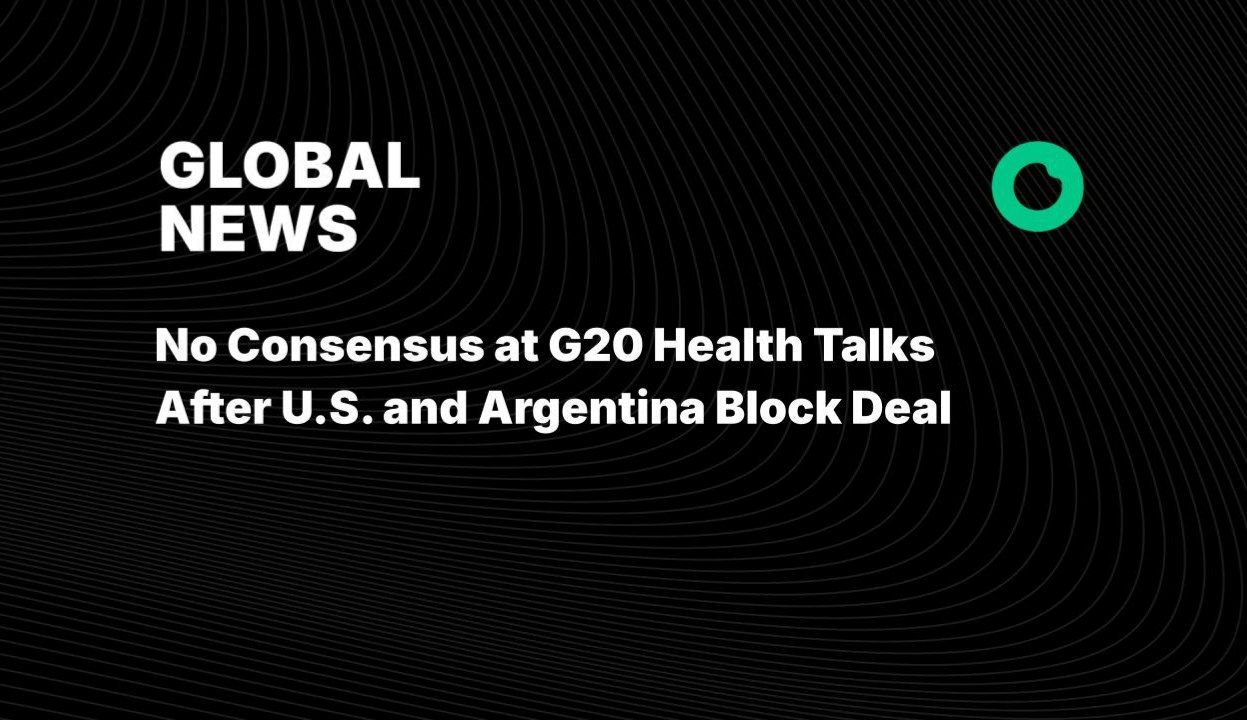According to Health Policy Watch, the United States, backed by Argentina, has reportedly blocked consensus on the final G20 Health Ministers’ statement following the group’s fourth and final working meeting of the year on Friday in Limpopo, South Africa.
In what was seen as a visible snub to the rest of the bloc, the U.S. delegation walked out of the meeting shortly after delivering its opening remarks as part of the “Troika” — representing the past, present, and upcoming presidencies of the G20. The G20, which includes the European Union and 19 other nations, accounts for roughly 85% of the world’s economic output and 75% of global trade.
The United States is set to host the G20 talks in 2026, following Brazil’s presidency last year.
Instead of a ministerial declaration adopted by consensus, the group was expected to release an Outcome Document and Chair’s Statement, sources told Health Policy Watch. The draft, reviewed by the outlet, emphasizes commitments to universal health coverage (UHC) through strengthened primary health care systems, investment in health financing and protection mechanisms such as insurance, expansion of the health workforce, and initiatives targeting noncommunicable diseases (NCDs) and antimicrobial resistance (AMR).
However, the draft also underscores the need for multilateral action on climate change and pandemic prevention, preparedness, and response (PPPR) — positions that the administration of U.S. President Donald Trump has vocally opposed.
“The recently adopted WHO Pandemic Agreement presents an opportunity to strengthen PPPR with equity at its centre and in line with the principles of sovereignty, solidarity, respect for human rights, and inclusivity,”
the draft states, according to Health Policy Watch. At the time of publication, the statement had not yet appeared on the G20 Health Track website.
The Trump administration has repudiated the WHO Pandemic Agreement, describing it as an infringement on national sovereignty. The deal, which took more than two years to negotiate, was formally adopted by WHO member states in May.
The Outcome Statement also calls for the timely conclusion of negotiations on the Pathogen Access and Benefit Sharing System Annex (PABS Annex). According to Health Policy Watch, the United States is reportedly planning to bypass this mechanism through bilateral deals that would tie global health aid to the sharing of pathogen data with “epidemic potential.”
In addition, the statement highlights the health impacts of environmental degradation and climate change, particularly for vulnerable populations and developing nations. It warns of the consequences of harmful human activities — including pollution, land-use change, and biodiversity loss — which increase the risk of zoonotic disease spillovers.
The draft reaffirms the need for a coordinated global response that integrates health into climate action frameworks, referencing international accords such as the 1992 Rio Declaration, the 2015 Paris Agreement, and the 2024 G20 Health Ministerial Declaration on Climate Change, Health and Equity, adopted in Rio de Janeiro. It also notes the adoption of the 2024 WHO Climate Change and Health Resolution and a subsequent Climate Change and Health Action Plan approved at the May 2025 World Health Assembly after an unsuccessful Saudi-led effort to block it.
The tensions surrounding the Health Ministers’ meeting coincided with statements from President Trump on Thursday, confirming that he would not attend the upcoming G20 Summit scheduled for 23–24 November in Johannesburg. Speaking a day earlier at the America Business Forum in Miami, Trump called for South Africa’s removal from the G20 — confusing it with South America — and claimed that
“for generations Miami has been a haven for those fleeing communist tyranny in South Africa.”


